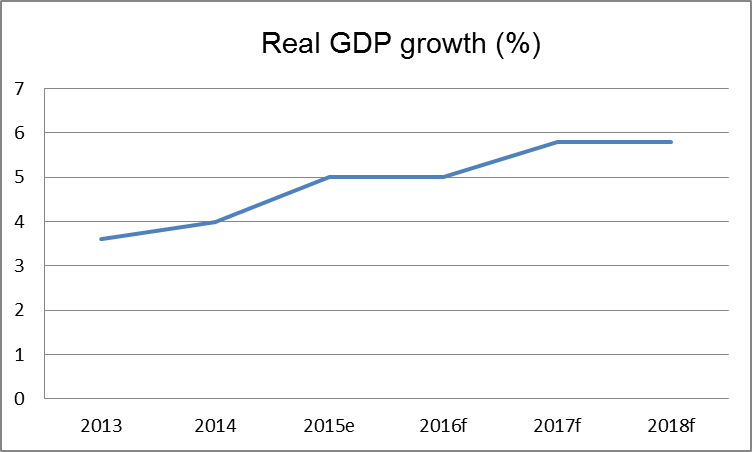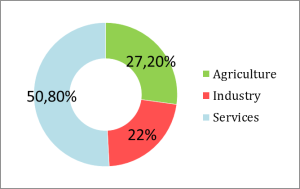UGANDA AT FIRST GLANCE
Uganda is East Africa’s third largest economy after Kenya and Tanzania and it enjoys a unique location at the heart of Sub-Saharan Africa making it a gateway for regional trade and investment. In the last fifteen years the Uganda’s economic recovery has been remarkable; in fact starting in the late 1980s the government has pursued a series of effective liberalization policies that resulted in a macroeconomic stability and a sustained period of high growth during 1987-2010 driven by an important investment response.
Real gross domestic product (GDP) grew on average by 7% per year in the 1990s and the 2000s, a rate that grew twice as fast as the average of Sub-Saharan Africa, while in the last decade the country witnessed a slowdown in the growth rate, which averaged about 5% per year. An upward trend is expected in the medium term, dependent on efficient implementation of large infrastructure projects as well as activities related to oil. To date agriculture is the most important sector of the economy, employing roughly 80% of the workforce and contributing for 27,2% of the country’s GDP, while the service sector accounts for 50,80% and the industry for 22%.
Agriculture
Uganda’s favourable soil conditions and climate have made the agricultural sector dominant in the country’s economy, accounting alone for 27,2% of GDP and employing 82% of the workforce. Uganda’s major export crop is coffee, which alone contributes for 19% of the country’s exports, but tea, tobacco and cotton are also important. The main food crops are plantains, cassava, sweet potato, millet and corn. Having attained high quality and safety standards for production and export, fish exports are the second largest earner for Uganda, even though there have been over-fishing problems and the government has created protected areas in lakes to avoid the capture of immature fishes. Forestry also supports the country’s economy through the sale of timber, honey, herbal medicines and ecotourism. In order to promote re-forestation and afforestation, the government is also attempting to enforce forest and environmental laws and regulations.
Industry
Although an agricultural economy, Uganda’s industry sector contributes reasonably well to the country’s GDP: with 5% of the workforce involved, it contributes 22% to Uganda’s GDP. Some of the most important sectors are the processing of agricultural products (like sugar, tobacco, cotton) and the production of electricity, cement and beverages (in particular, the production of beer has increased dramatically in recent years). Notably, the industrial sector is being rebuilt to recommence production of construction materials including cement, corrugating roofing sheet, supportive roads and paint.
Telecommunications: to date, as a result of the government’s economic reforms, the telecommunication sector in Uganda is among the most liberalized sectors in Africa.
Electricity: less than 15% of the population can access electricity, and more than 90% remains unconnected to the national grid. Therefore Uganda needs great investments to develop the country’s electricity grid.
Mining: although Uganda has huge deposits of gold, copper, cobalt and tantalite, there is a lack of sufficient explorations.
Oil and gas: in the last decades the government has made great efforts in the exploration of oil and gas, and recently deposits have been discovered in the Albertine Graben region, in the north part of the East African Rift Valley.
Finally, due to increased domestic security, market reforms, and tax breaks, Uganda’s manufacturing sector is growing, increasing the production of light consumer goods and textiles.
Services
The service sector is the one that contributes the most to Uganda’s GDP (about 50%) as it includes, among others, financial services, wholesale and retail trade, infrastructure (including energy), transports and communications, real estate activities, education, health, hotels and restaurants. Furthermore, Uganda had opened up its services sector to foreign investment, and foreign ownership of 100% equity is allowed in a range of activities as banking, insurance, telecommunications, tourism, construction, production and distribution of energy and professional services.

 Italiano
Italiano








